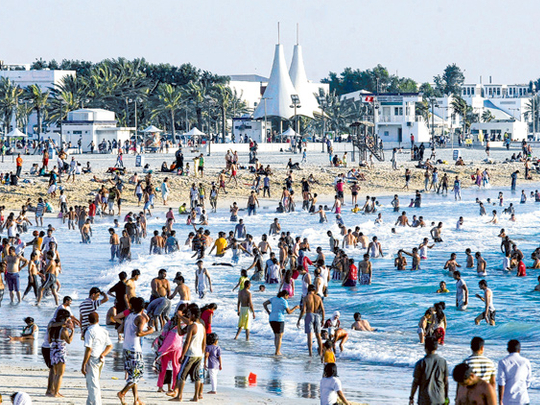
Dubai: Sun lovers take heed.
Sunbathing without regard for the time of the day or the month in the year can be downright dangerous, if not fatal.
The pursuit of a perfect tan can cause you your life as different kinds of skin cancers — basal cell carcinoma, squamose cell carcinoma and melanoma, the deadliest skin cancer of all — are on the rise.
While there is no comprehensive report on the incidence rate of skin cancers in the UAE, doctors warn against sun exposure as the region receives strong rays of the sun throughout the year.
“Excessive exposure to the sun can lead to problems such as skin and eye cancer,” Dr Babu Shersad, specialist in internal medicine and nephrologist at First Medical Centre, told Gulf News. “Tanning beds are used for cosmetic purposes, especially among the youth. They emit ultraviolet rays, called UV rays. UVA and UVB are both dangerous rays that affect the deep and top layers of the skin, respectively. When the skin is exposed to these UV rays, melanocyte cells produce melanin, a brown pigment that darkens the skin. This is how the skin attempts to protect itself from further damage.”
Dr Shersad added that the number of skin cancers occurring due to indoor tanning and oils is higher than the number of lung cancers caused by smoking cigarettes.
Tanning devices including tanning beds and oils are considered unsafe by organisations such as the US Food and Drug Administration, the World Health Organisation and the American Academy of Dermatology.
Should you sunbathe — whether indoors (on tanning beds) or outdoors on the beach or not — is a good question to pose to a dermatologist, especially when there is a high incidence of Vitamin D deficiency in the UAE.
“Exposure to the sun has to be done in absolute moderation,” cautions Dr Sonia Wilson, specialist and HOD, Dermatology at the RAK Hospital, Ras Al Khaimah. “Five to 10 minutes of unprotected sun exposure any time until 10am is what you require for your body to synthesise Vitamin D. Between 10am to 4pm people are advised to stay away from the sun as it increases your chances of getting skin cancer from its strong ultraviolet rays,” she adds.
People are often seen at the beaches in Dubai slathered with tan oil, sun bathing at all hours before the sun sets. Tanning oils contain harmful chemicals, fragrances, preservatives and petroleum-based derivatives to accelerate melanogenesis (over production of melanin cells which is a natural response of the body to protect from sun burn). It is this melanin that gives people the healthy tan colour that many fair skinned people, especially Caucasians love to flaunt. Practically all tanning oils contain harmful ingredients such as mineral oil (a known carcinogen) that blocks the pores. This blockage causes a build-up of toxins. Other ingredients include chemicals such as sodium hydroxy methyl glycenate, which is a natural preservative and is an irritant to the skin under the eyes. Many other additives such as amyl acetate, a preservative and ocytl stearate a thickening agent that give a flawless tan are very harmful to the skin and literally cook you up,” points out Dr Wilson.
Dr Wilson says that any kind of sun exposure in from 10am -4pm on a regular basis can result in stimulating cancer in those predisposed to the disease. “The UVA rays penetrate the dermal and epidermal junction and actually damage the cell DNA. That is why both direct and indirect sun tanning whether done in tanning booths or in the open sun is not advisable. Caucasians with very fair skin are most prone to sun damage as they have lesser production of melanin cells. Besides cancer which is an extreme result, they are likely to have sun burns, freckles and early emergence of wrinkles.
Despite a good awareness about skin cancers there are die hard sunbathers in the UAE who cannot give up going to the beach and swimming in the sun. Debbie Nicole,a Dubai resident and change practitioner has to be at the beach everyday, swim a lap and walk in the sun. “I am an Australian and belong to a generation where we were sunbathing from the age of 15, right from the big toe to the head with baby oil for nine hours every summer. We Aussies believe we are not healthy until you are brown. So I have to get the sun and salt daily. However, I use a cream with 15 per cent Sun Protection Factor (SPF) and go for regular skin check ups. Except for the occasional sun spot, I have been clear so far.”
Noura Al Imam, a wellness specialist, visits the beach at least two to three times but chooses to go at 4.30 or 5 during the summers and at 2pm during winter as she finds being in the sun very therapeutic and meditative. While she is aware of the incidence of skin cancers, she is not regular with her check-ups and pops into the dermatologist’s clinic occasionally.
Kayleigh Sealey loves the sun when it is at its hottest at noon. A mother of one , she finds time only at the weekend and makes the most of the outdoors from 12 noon to 2pm. During summers she stays in the pool to keep cool. “I use a tanning oil with 15 per cent SPF and a face cream with 30 per cent SPF. I have known of skin cancers but I think going out once a week will not cause so much harm. Occasionally I do get skin inflammations and do get slightly overcooked, but I like the result afterwards as my skin gets a healthy tan. I also feel this is my time to relax.
— With inputs from Nawal Al Ramahi, intern at Gulf News












